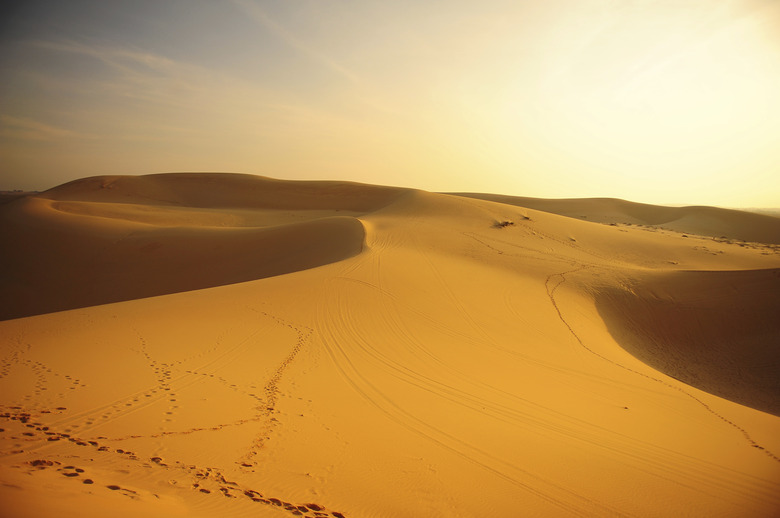What Are Four Nonliving Things In A Desert Ecosystem?
Ecosystems, short for ecological systems, result from the interaction of biotic, abiotic and cultural components. Biotic and cultural components are all living things, nonhuman and human and including microscopic life, present in the ecosystem. Abiotic components are those nonliving things, especially environmental elements that exist within the ecosystem, such as water, dirt and air. In a desert ecosystem, much of what designates the system as desert is nonliving.
Rock
Rock
The heat of the desert often makes it difficult for living creatures, both plant and animal, to survive, leaving vast tracts of bare land. As with most other ecosystems, rocks and other such chunks of solid earth are found all over the desert. Certain types of semi-precious materials such as quartz can be found among the rocks in desert ecosystems.
Sand
Sand
Made up of fine rock particles, sand is likely the most identifiable element of the desert ecosystem. As wind blows through flat land, with little vegetation to provide a shield, bits of rock break off to form sand.
Mountains
Mountains
Although not typically associated with the image of flat, open deserts, mountains are often found within the ecosystem. Carved by strong winds over millions of years, desert mountains are often steep and craggy rather than smooth and rolling.
Water
Water
Although not as abundant in the desert ecosystem as in others, water is still found throughout the desert. The few types of life found existing in the desert depend on the presence of water, from running rivers to rain and runoff.
Air
Air
Although omnipresent in all other ecosystems, air plays an especially important role in the creation of the desert. The lack of vegetation allows the wind to blow across the land and slowly carve up the rocks resulting in both sand and mountains. It's also wind which creates such spectacles as sand dunes and natural bridges.
Cite This Article
MLA
Kroll, Jess. "What Are Four Nonliving Things In A Desert Ecosystem?" sciencing.com, https://www.sciencing.com/four-nonliving-things-desert-ecosystem-8629525/. 13 March 2018.
APA
Kroll, Jess. (2018, March 13). What Are Four Nonliving Things In A Desert Ecosystem?. sciencing.com. Retrieved from https://www.sciencing.com/four-nonliving-things-desert-ecosystem-8629525/
Chicago
Kroll, Jess. What Are Four Nonliving Things In A Desert Ecosystem? last modified August 30, 2022. https://www.sciencing.com/four-nonliving-things-desert-ecosystem-8629525/
